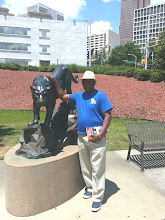Then you will know the truth and the truth will set you free
John 8:32
This parable is said to be one of the hardest to teach or explain. On the surface it is about a dishonest steward who is found out. He then manipulates the accounts in his favor in order to appease his master. The Bible says we are slaves to whatever controls us. This dishonest steward was enslaved to his passions to amass wealth for himself by using his office of steward to conceal his "iniquity". The only skills the steward had was being a steward but because he did not respect his master he was eventually brought to account for his failure as a steward. The Bible says this steward "couldn't dig and was ashamed to beg". He couldn't do manual labor and he was full of pride, so asking, begging for help was out of the question.
This parable is about trust and accountability. It's about judgement. The master trusts that the steward will have his best interests at heart. Until it is brought to his attention (by some or they) the master has no reason to doubt his steward. Some or they, depending on which translation is being referred to, means the same. Co-stewards. These fellow stewards went to the master. The Bible tells us to worry about nothing and pray about everything. Philippians 4:6. So, we don't confront pastors or preachers outright when we observe something that does not line up to The Word but instead we make our requests known to God on our knees. Did you know that in some cultures preacher and pastor are different offices with different functions. For example in the Chinese church a preacher must prove that he is capable of leading the church before he is considered a pastor and a preacher is restricted in that he cannot administer sacrament, holy communion or baptism. You have to prove that you are trustworthy. The European (Greek, Roman) church confused the offices in that they understand all offices to be the same with different functions. A bishop and elder are not equal but their function is considered the same. In the natural the parts of the body are different with different functions. Hands and feet are different and serve a different purpose. Promotion in the modern church too often is based on how well you meet the criteria set by the title holders in the church. 1 Timothy 4:14 is an overview of the standards of biblical promotion. Modern stewards (pastors) many times are groomed to inherit churches, congregations and lands as an inheritance package. In Acts 16 Paul meets Timothy for the first time, begins to groom him, sets himself up as Timothy's "spiritual father" against the admonition of Jesus Christ himself who said in Matthew 23:9 - And call no man your father upon the earth: for one is your Father, which is in heaven. He then ordains and makes Timothy Bishop of Ephesus. Were the other Apostles consulted? When Judas was replaced the apostles acted only under the unction of the Holy Spirit after conferring among themselves. The practice of church appointments is Pauline in its origin and can be traced back to the church of Acts and its first bishop Timothy.
The modern church has taught inheritance totally out of Biblical context. A good man leaves an inheritance for his children's children, but a sinner's wealth is stored up for the righteous. Proverbs 13:22. 1 Peter 1:4 says our inheritance is kept in heaven. Inheritance and wealth are two different things according to Proverbs 13:22. Biblical inheritance is heavenly, spiritual and eternal. Wealth is earthly and temporal. We (believers) are admonished to use the wealth that sinners trust in. We don't chase wealth like the unGodly. If we are living in the perfect Will of God, God will cause wealth to find us.
Why do you call me good?" Jesus answered a rich man claiming to want salvation. Jesus replied; "No one is good-except God alone. You know the commandments: 'Do not murder, do not commit adultery, do not steal, do not give false testimony, do not defraud, honor your father and mother.'" Mark 10:17-22. "Teacher," he declared, "all these I have kept since I was a boy."
Jesus looked at him and loved him. "One thing you lack," he said. "Go, sell everything you have and give to the poor, and you will have treasure in heaven. Then come, follow me."At this the man's face fell. He went away sad, because he had great wealth.
One commentator has observed this: being an elite, the dishonest steward had never really wanted for anything, therefore he was at a disadvantage for committing to true service as an honest steward. Why? It's easy to keep the commandments if you have never been tempted materially to break them. That's why Jesus presented him with a challenge that he had never encountered before. Give up the stuff that makes you comfortable and happy. And, if you pastors and preachers, really want to learn to be the kind of stewards that the master approves of you have to give up amassing earthly wealth as an inheritance. The Kingdom of God is not a Mom-and-Pop shop or family business. You expect your congregation to give out of their poverty while you live like a pastor. You can't continue to live above your congregation . As the sheperds you have to find a way either to live in the pasture with your sheep or bring them up to where you are. God has promised He will change the sheperds for some that are willing to lead His sheep according to His Word. Jeremiah 23. As always seek ya first The Kingdom Of God and don't worry about the rest...
-

No comments:
Post a Comment